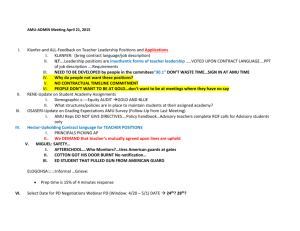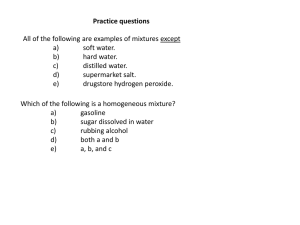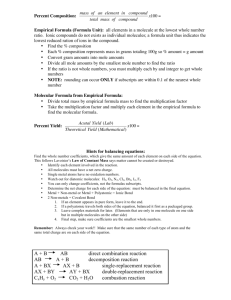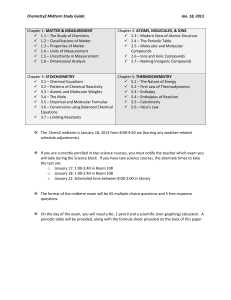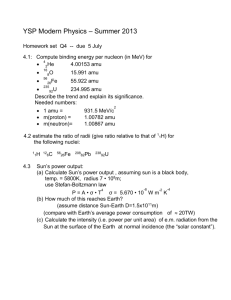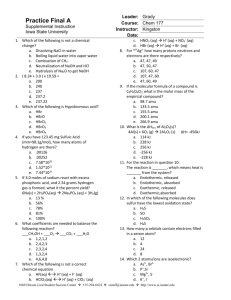% Composition
advertisement
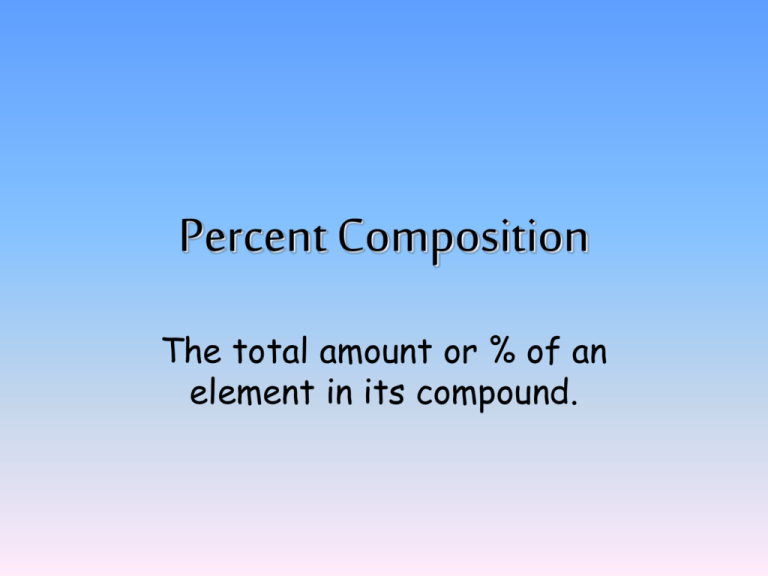
Percent Composition The total amount or % of an element in its compound. Percent Composition Three STEPS 1) Formula determination using Criss-cross determine subscripts 2) Formula mass using periodic table, total all elements 3) % Calculation element mass/formula mass x 100 Percent Composition Find the percent composition of Iron(II)Nitrate Step 1 Determine the formula Fe(NO3)2 Step 2 Determine the formula mass 1 Fe atom 1 x 55.8 amu 2 N atoms 2 x 14 amu 6 O atoms 6 x 16 amu = 55.8 amu = 28 amu = 96 amu 179.8 amu Percent Composition Step 3. Calculate % of total mass 1 Fe atom = 55.8 amu Fe x 100 = 31.0 % 179.8 amu Fe(NO3)2 2 N atoms = 28 amu N 179.8 amu Fe(NO3)2 x 100 = 15.6% 6 O atom = 96 amu O 179.8 amu Fe(NO3)2 x 100 = 53.4 % Percent Composition Problems: 1. Determine the % composition of Na and C in Sodium Carbonate. Formula Na2CO3 Total mass 106 amu Math % Na =46/106 x100 Na= 43.4% C =12/106 x100 C= 11.3% O =48/106 x100 O= 45.3% Percent Composition 2. Formula Al2(SO4)3 Determine the % composition of all the elements in Aluminum Sulfate. Total mass Math % Al =54/342.3 x100 Al= 15.8% 342.3 S =96.3/342.3 x100 amu S= 28.1% O =192/342.3 x100 O= 56.1% Percent Composition 3. Formula Determine the % composition of all the elements in Sodium Hydroxide. Total mass Math % Na = 23.0/40.0 x100 Na= 57.5% NaOH 40.0 amu H = 1/40.0 x100 H= 2.5% O = 16/40.0 x100 O= 40.0% Percent Composition 4. Determine the % composition of C in Carbon Dioxide. Formula CO2 Total mass Math % 44.0 amu C =12.0/44.0 x100 C= 27.3% O =32.0/44.0 x100 O= 72.7% Percent Composition 5. In a sample of Pitchblende, Uranium ore, it is determined that there are 2.5 g of Uranium in a 500.0 g sample. What % of the ore is Uranium? Little different problem but still % comp. Total Ore = 500.0 g Uranium = 2.5 g % = U / Ore x 100 2.5 g/ 500.0 g x100 U = 0.50% of the Ore % Composition Practice Problem What is the % composition of all the elements in Ammonium Phosphite. Step 1 Formula (NH4)3PO3 Step 2 Molar Mass 3(14.0) + 12(1.0) + 31.0 + 3 (16.0) = 133.0 g Step 3 % Comp N = 42/133 x 100 = 31.6 % H = 12/133 x 100 = 9.0 % P = 31/133 x 100 = 23.3 % O = 48/133 x100 = %36.1 % Empirical Formula What if you were given the % and asked to find the formula. A compound contains 32.38 % Na 22.65 % S 44.99 % O What is the formula of this compound? Empirical Formula Step 1 Calculate the number of moles for all elements in compound. a) If given as mass convert using molar mass. b) If given as a %, treat as if it is a 100 g Step 2 Determine the smallest mole value. Step 3 Determine mole ratio of elements by dividing by lowest mole value. Empirical Formula Step 4 If a mole ratio develops that is not a whole # or easily rounded off, multiply all ratios by a small integer (2, 3 or 4) to convert the fraction into a whole #. Step 5 Apply mole ratio to determine the Empirical formula. (The whole # ratio become the subscripts!) Bonus Step If asked to find the Molecular formula, divide the empirical formula mass into the molecular mass to get an integer. Multiply that integer through the empirical formulas subscripts. The result will be the molecular formula. Empirical Formula Step 1 Convert all values to moles Start with a 100 g sample if in % 32.38 % Na 32.38 g of Na / 23.0 g Na 22.65 % S 22.65 g of S / 32.1 g S 44.99 % O 44.99 g of O / 16.0 g O Empirical Formula Step 2:: Determine the smallest value. 32.38 g of Na = 1.41 mol Na 22.65 g of S = 0.706 mol S 44.99 g of O = 2.81 mol O smallest Empirical Formula Step 3:: Divide through to get mole ratio. Na 1.41 mol Na /0.706 1.997 mol 2 0.706 mol S 0.706 mol S /0.706 1 mol 1 O 2.81 mol O/0.706 3.98 mol 4 Empirical Formula Step 4:: Ratio are whole # Skip step Step 5 :: whole # ratios convert to subscripts Na 2 S1 Na2SO4 O4 Sodium Sulfate Empirical Formula Homework From your books:: Go to page 246. Review sample problems L, M and N Complete practice problems 1-3 Pg. 247 Complete practice problems 1-2 Pg. 249
